Zambia
DCAF and its Zambian partner Southern African Centre for Constructive Resolutions of Disputes (SACCORD) launched a 14-month project in mid-2022, to improve the domestic legal framework governing public assemblies, strengthen oversight of and accountability for management of public assemblies by the Zambia Police Service (ZPS) and the ZPS’ use of force during such operations, and improve the way in which the ZPS manage public assemblies.
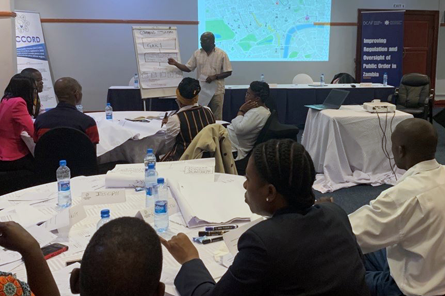
Workstreams/Projects
This project is possible thanks to the generous support of the Swedish International Development Cooperation Agency.
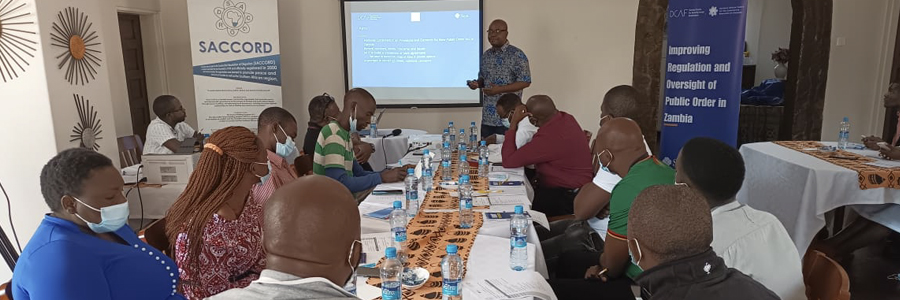 While citizens’ right to freedom of (peaceful) assembly is protected by the Zambian Constitution, in practice, successive governments have used the overly broad and vague provisions of the 1955 Public Order Act to restrict this fundamental right. This has led to calls by civil society organizations and the public to reform the law.
While citizens’ right to freedom of (peaceful) assembly is protected by the Zambian Constitution, in practice, successive governments have used the overly broad and vague provisions of the 1955 Public Order Act to restrict this fundamental right. This has led to calls by civil society organizations and the public to reform the law.
After years in opposition, the United Party for National Development and its long-time leader, Hakainde Hichilema, won the 2021 general election on a progressive reform platform, including the stated commitment to reform the Public Order Act.
As part of the first pillar of the project, DCAF and SACCORD will implement the following activities:
- Organization of consultations with Zambian stakeholders on the Public Order Act in eleven major cities around the country;
- Submission to the Government of a position paper—based on the national consultations—on the Public Order Act;
- Participation in the Public Order Act Reform Technical Committee of the Zambia Law Development Commission and the Ministry of Home Affairs;
- Awareness raising activities and engagement with the media to increase the population and all stakeholders’ understanding of the new Act.
 An effective accountability framework is often key to translating laws into practice. In Zambia, various assessments have shown that there is limited oversight of policing operations by Parliament, the Ministry of Home Affairs, civil society, and even internal mechanisms within the police. The weak system of oversight has led to a general level of impunity for excessive use of force and other violations of human rights by the police during public order operations.
An effective accountability framework is often key to translating laws into practice. In Zambia, various assessments have shown that there is limited oversight of policing operations by Parliament, the Ministry of Home Affairs, civil society, and even internal mechanisms within the police. The weak system of oversight has led to a general level of impunity for excessive use of force and other violations of human rights by the police during public order operations.
As part of the second pillar of the project, DCAF and SACCORD will implement the following activities:
- Training for Parliament on oversight of police public order operations;
- Training for civil society organizations on oversight of police public order operations;
- Support for media on reporting on and providing oversight of police public order operations;
- Support to the Zambia Human Rights Commission on oversight of police public order operations;
- Advising and training for internal and external police oversight institutions, including the Police Public Complaints Commission and the Zambia Police Service Integrity Committee and Legal & Professional Standards Unit on oversight of police public order operations;
- Development of an e-learning course for oversight actors on human rights and accountability in the context of public assemblies.
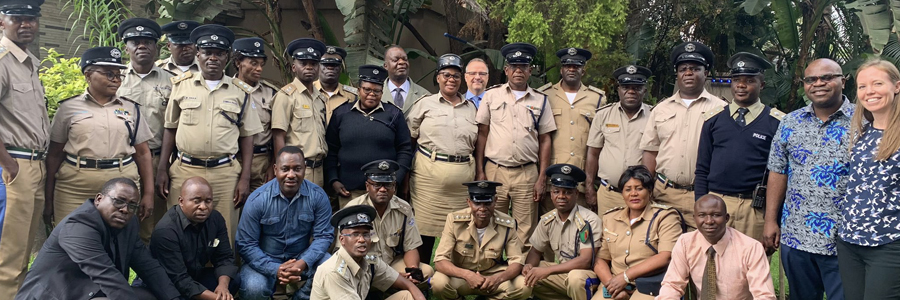 In recent years, Zambia has witnessed a growing number of protests, demonstrations and public assemblies. The ZPS are seeking to strengthen their capacity to manage public order and to respect and protect human rights before and during public assemblies. Once the new public order legislation is adopted, there will also be a need to support the ZPS in operationalizing it.
In recent years, Zambia has witnessed a growing number of protests, demonstrations and public assemblies. The ZPS are seeking to strengthen their capacity to manage public order and to respect and protect human rights before and during public assemblies. Once the new public order legislation is adopted, there will also be a need to support the ZPS in operationalizing it.
As part of the third pillar of the project, DCAF and SACCORD will therefore implement the following activities:
- Assistance to the Zambia Police Service in assessing the governance of their use of force practices and systems;
- Development of tools for the Zambia Police Service to more effectively manage public assemblies;
- Training for senior and mid-level officers and Training of Trainers for the Zambia Police Service on managing public assemblies in a human rights-compliant manner;
- Development of an e-learning course for frontline officers of the Zambian Police Service on human rights and accountability in the context of managing public assemblies.

DCAF supports the Western Balkan economies in their effort to enhance cyber hygiene, both of public sector staff, and of the general public, as well as in their outreach and communication activities. Safe online practices are crucial for cyber resilience. The project supports public institutions in establishing strategic plans on increasing cyber hygiene, and promotes the understanding of cybersecurity risks and threats, encouraging safe and responsible online behaviour.
In order to generate awareness in cybersecurity in the general public and small businesses, DCAF supports cybersecurity actors in the Western Balkans to organise cybersecurity awareness raising campaigns targeted at wider social groups and individuals, with the aim of influencing cybersecurity behavioural change. We support efforts of cybersecurity institutions in the Western Balkans to better communicate the importance of cyber protection, especially focusing on the issues of personal data protection, securing business continuity, rising awareness of cyber threats such as online scams and frauds.
Together with Western Balkan national CERTs, we have developed innovative awareness raising campaign strategies and materials for multimedia and digital tools.
Watch all the animated short clips of the campaign on our YouTube channel
Watch all the videos of the campaign on our YouTube channel
Download and print the posters to raise awareness about cybersecurity around you
Examples of recent activities
- Webinar on Cyber Essentials and Cyber Baseline. December 2021.
- Development of online courses on Cyber Hygiene for Public Servants
- Support to CERTs communication capacities in Albania, Bosnia Herzegovina, Kosovo, Montenegro, and North Macedonia
Knowledge Products
- Handbook on Effective Use of social media for Cybersecurity Awareness Raising Campaigns
- Guidebook on minimum standards for setting up a system of cyber hygiene in public institutions and SMEs (upcoming publication)
- Booklet for national CERTs on Crisis Communication and Communication Plans (upcoming publication)
- E-learning course on Cybersecurity and Good Governance (upcoming course)
- Online course on Cyber Hygiene for Public Servants
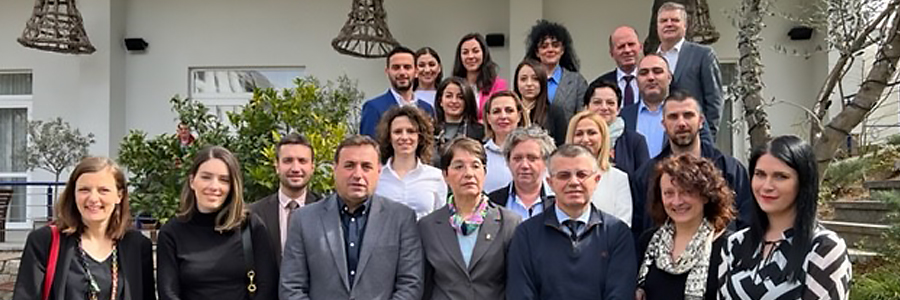 The project contributes to more informed cybersecurity policy discussions, both at the regional and national levels, by encouraging parliamentary staff and civil society organisations to play a more effective role in cybersecurity sector oversight and research.
The project contributes to more informed cybersecurity policy discussions, both at the regional and national levels, by encouraging parliamentary staff and civil society organisations to play a more effective role in cybersecurity sector oversight and research.
Examples of recent activities
- Seminar on Cybersecurity Good Governance for Parliamentary Staffers from the Western Balkans. Tirana, Albania, March 2022.
Knowledge Products
- Introduction to Cybersecurity Governance – A Tool for Members of Parliament
- Guide to Good Governance in Cybersecurity
- Democratic Governance Challenges of Cybersecurity
- Backgrounder on Cybersecurity Governance (upcoming publication)
- Book on Cybersecurity Oversight (upcoming publication)
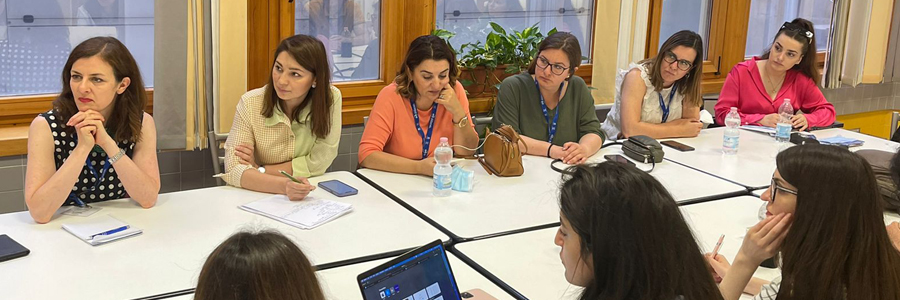 DCAF supports civil society and young leaders in their efforts to play a more active role in cybersecurity.
DCAF supports civil society and young leaders in their efforts to play a more active role in cybersecurity.
To contribute to informed regional cybersecurity policy discussions, the project has supported the establishment of a Western Balkans Cybersecurity Research Network, composed of civil society researchers from the region. The network research aspects covering cybersecurity and human rights, cybersecurity needs of vulnerable groups, gender and cybersecurity, in their respective national contexts. This effort produces more comparative research and information on the progress in cybersecurity governance in the region, and supports Western Balkans civil society to engage more in cybersecurity issues and to develop, research, and draft recommendations that promote an approach to cybersecurity taking into account the security needs of all, for governments to integrate a more human-centric approach in their legal and policy frameworks.
Through our ‘Young Faces’ programme, we work on promoting cybersecurity policy research and knowledge sharing among young professionals across the Central and Eastern Europe region, aiming to involve young leaders to explore and engage in cybersecurity network and expertise. The programme champions the development of young professionals from the region, from the public and private sector, at the start of their careers to raise their awareness on important cybersecurity governance challenges. Over the course of 6 months and through a winter and summer schools, the participants can familiarise themselves with the topics, learn from international experts, share experiences with their peers, and play an active role in research of cybersecurity by producing policy papers under the mentorship of experts.
Spotlight: papers from DCAF’s Young Faces 2022
Promising cybersecurity ideas from emerging Western Balkans civil society leaders
DCAF’s Young Faces 2022 brought together 30 young scholars and leaders for enriching seminars on cybersecurity, in the context of the UK Foreign, Commonwealth and Development Office (FCDO) supported-project, ‘Good Governance in Cybersecurity in the Western Balkans’. 14 out of this group wrote policy papers. These covered a range of issues of increasing importance in the six Western Balkans economies of the project: Albania, Bosnia and Herzegovina, Kosovo*, Montenegro, North Macedonia and Serbia.
* This designation is without prejudice to positions on status, and is in line with UNSC 1244 and the ICJ Opinion on the Kosovo declaration of independence.
DCAF spotlights three among all of the thoughtfully written papers:
- Doris Pasha’s ‘E-Governance and the Importance of Personal Data Protection in Albania’;
- Mejreme Asllani’s ‘Cyber Attacks and Critical Infrastructure in Kosovo’; and
- Oliver Risteski’s ‘Intrusions of State Digital Infrastructure in Macedonia: Digital Human Rights Impact Analysis’
Disclaimer: The views expressed are those of the authors alone and do not necessarily reflect DCAF positions.
Examples of recent activities
- Young Faces Winter School Webinars. Online, January 2022.
- Young Faces Summer School and participation in the European Dialogue on Internet Governance (EuroDIG). Trieste, Italy, June 2022.
- Workshop on Gender and Cybersecurity for the Western Balkans Cybersecurity Research Network. Durrës, Albania, July 2022.
- Advocacy campaign by the Western Balkans Cybersecurity Research Network. Western Balkans, Summer 2022.
Knowledge Products
- Cyber Violence Against Women and Girls in the Western Balkans: Selected Case Studies and a Cybersecurity Governance Approach
- Thematic Paper on Gender and Cybersecurity
- Western Balkans Cybersecurity Research Network: a six-chapter publication on Human Rights and Cybersecurity
- Western Balkans Cybersecurity Research Network: a six-chapter publication on Gender and Cybersecurity (upcoming publication)
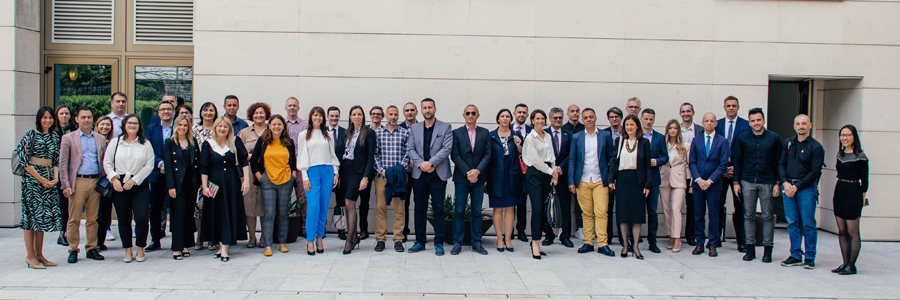 DCAF promotes cybersecurity capacity building in the Western Balkans to improve cyber-readiness of the societies through the strategic training of cybersecurity experts and the development of educational program in cybersecurity. The programme supports the inclusion of cybersecurity capacity building in national cybersecurity strategies, and the further development of cybersecurity education at all levels.
DCAF promotes cybersecurity capacity building in the Western Balkans to improve cyber-readiness of the societies through the strategic training of cybersecurity experts and the development of educational program in cybersecurity. The programme supports the inclusion of cybersecurity capacity building in national cybersecurity strategies, and the further development of cybersecurity education at all levels.
- Regional Conference on Cybersecurity Capacity Building. Podgorica, Montenegro, May 2022.
- Report on the Regional Conference on Cybersecurity Capacity Building, Mika Kerttunen, May 2022.
Watch all videos of the conference "Cybersecurity Capacity Building"
Contacts
Anne Bennett, Head of Division, Sub-Saharan Africa Division (a.bennett@dcaf.ch)
Max Van Wesenbeeck, Project Officer, Sub-Saharan Africa Division (m.vanwesenbeeck@dcaf.ch)